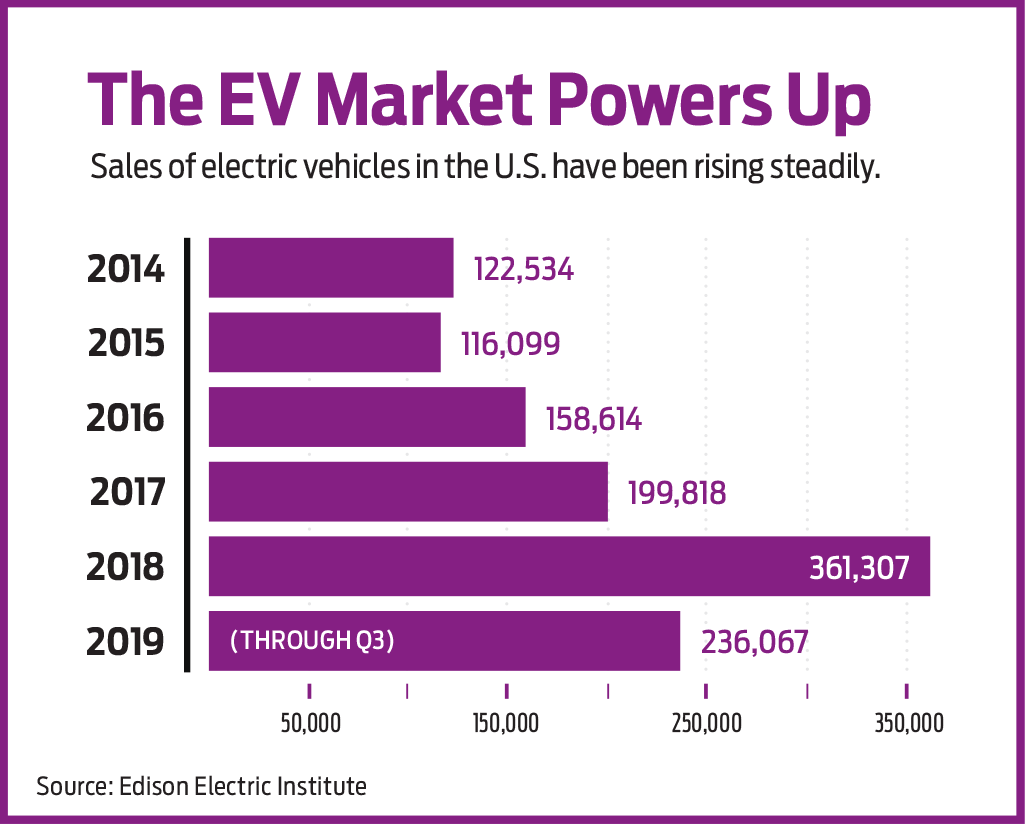Electric Cars Cruise Into the Mainstream
Sales are rising, but they’re still best for commuting and shorter drives.


Profit and prosper with the best of Kiplinger's advice on investing, taxes, retirement, personal finance and much more. Delivered daily. Enter your email in the box and click Sign Me Up.
You are now subscribed
Your newsletter sign-up was successful
Want to add more newsletters?

Delivered daily
Kiplinger Today
Profit and prosper with the best of Kiplinger's advice on investing, taxes, retirement, personal finance and much more delivered daily. Smart money moves start here.

Sent five days a week
Kiplinger A Step Ahead
Get practical help to make better financial decisions in your everyday life, from spending to savings on top deals.

Delivered daily
Kiplinger Closing Bell
Get today's biggest financial and investing headlines delivered to your inbox every day the U.S. stock market is open.

Sent twice a week
Kiplinger Adviser Intel
Financial pros across the country share best practices and fresh tactics to preserve and grow your wealth.

Delivered weekly
Kiplinger Tax Tips
Trim your federal and state tax bills with practical tax-planning and tax-cutting strategies.

Sent twice a week
Kiplinger Retirement Tips
Your twice-a-week guide to planning and enjoying a financially secure and richly rewarding retirement

Sent bimonthly.
Kiplinger Adviser Angle
Insights for advisers, wealth managers and other financial professionals.

Sent twice a week
Kiplinger Investing Weekly
Your twice-a-week roundup of promising stocks, funds, companies and industries you should consider, ones you should avoid, and why.

Sent weekly for six weeks
Kiplinger Invest for Retirement
Your step-by-step six-part series on how to invest for retirement, from devising a successful strategy to exactly which investments to choose.
Electric vehicles aren’t just for environmentally conscious celebrities and high-tech entrepreneurs anymore. More than 1.3 million EVs, including plug-in hybrids, were on the road in the U.S. as of September, according to the Edison Electric Institute. That same month, the EV share of new-car sales hit 2.6%, a high for 2019. Ford recently made a splash with its upcoming Mustang Mach-E all-electric SUV, the fifth pure EV SUV on the market.
To fans, all-electric vehicles such as the Tesla models, Chevrolet Bolt and Nissan Leaf provide smooth and noiseless driving, low maintenance, quick acceleration and a premium feel. But there are hurdles to going electric. These cars are more expensive to buy or lease than their gas-powered counterparts. Electric vehicles and plug-in hybrids (which have a gas engine as well as a battery) purchased in 2010 or later may be eligible for a federal income tax credit of up to $7,500, but this credit starts phasing out once a manufacturer has sold 200,000 EVs—which is the case for Cadillac, Chevrolet and Tesla.
Some states offer their own incentives, which you can find by searching online. Ask your local utility company about any rebates or other perks it offers. Or consider buying a used car, if you live in a state such as California where off-lease EVs are plentiful in the used car market. “You won’t get the latest tech or longest ranges, but you can pick up certain models for less than $10,000,” says Dan Edmunds, director of vehicle evaluation at car-information site Edmunds.com.
From just $107.88 $24.99 for Kiplinger Personal Finance
Become a smarter, better informed investor. Subscribe from just $107.88 $24.99, plus get up to 4 Special Issues

Sign up for Kiplinger’s Free Newsletters
Profit and prosper with the best of expert advice on investing, taxes, retirement, personal finance and more - straight to your e-mail.
Profit and prosper with the best of expert advice - straight to your e-mail.
Even if the price is right, EVs are most practical for drivers who can recharge their cars in their home garage rather than rely on public charging stations. Edmunds, whose family is on their third EV, says owning an electric vehicle is easier than many people think. “People plug in their smartphones more often during the day than they’d have to plug in their car.”
Electric-only cars also work best for owners who drive reasonably short distances around town or have another car for long distances. A number of EVs offer more than 200 miles of driving range, with pricier models inching toward 400 miles. But charging stations are still not as convenient as gas stations, and it may take several hours to charge the vehicle.

Profit and prosper with the best of Kiplinger's advice on investing, taxes, retirement, personal finance and much more. Delivered daily. Enter your email in the box and click Sign Me Up.

-
 5 Vince Lombardi Quotes Retirees Should Live By
5 Vince Lombardi Quotes Retirees Should Live ByThe iconic football coach's philosophy can help retirees win at the game of life.
-
 The $200,000 Olympic 'Pension' is a Retirement Game-Changer for Team USA
The $200,000 Olympic 'Pension' is a Retirement Game-Changer for Team USAThe donation by financier Ross Stevens is meant to be a "retirement program" for Team USA Olympic and Paralympic athletes.
-
 10 Cheapest Places to Live in Colorado
10 Cheapest Places to Live in ColoradoProperty Tax Looking for a cozy cabin near the slopes? These Colorado counties combine reasonable house prices with the state's lowest property tax bills.
-
 9 Types of Insurance You Probably Don't Need
9 Types of Insurance You Probably Don't NeedFinancial Planning If you're paying for these types of insurance, you may be wasting your money. Here's what you need to know.
-
 10 Things You Should Know About Buying a Car Today, Even if You've Bought Before
10 Things You Should Know About Buying a Car Today, Even if You've Bought BeforeIf buying a car is on your to-do list, and it's been a while since you went shopping for a new one, this guide will help avoid any nasty shocks in the showroom.
-
 Get the Best Car Deal in Retirement: Here's the Trick
Get the Best Car Deal in Retirement: Here's the TrickPlanning on shopping for a new car this Labor Day weekend? Here’s how to haggle for a better price, even though you're retired.
-
 Amazon Resale: Where Amazon Prime Returns Become Your Online Bargains
Amazon Resale: Where Amazon Prime Returns Become Your Online BargainsFeature Amazon Resale products may have some imperfections, but that often leads to wildly discounted prices.
-
 Roth IRA Contribution Limits for 2026
Roth IRA Contribution Limits for 2026Roth IRAs Roth IRAs allow you to save for retirement with after-tax dollars while you're working, and then withdraw those contributions and earnings tax-free when you retire. Here's a look at 2026 limits and income-based phaseouts.
-
 Four Tips for Renting Out Your Home on Airbnb
Four Tips for Renting Out Your Home on Airbnbreal estate Here's what you should know before listing your home on Airbnb.
-
 Five Ways to a Cheap Last-Minute Vacation
Five Ways to a Cheap Last-Minute VacationTravel It is possible to pull off a cheap last-minute vacation. Here are some tips to make it happen.
-
 How Much Life Insurance Do You Need?
How Much Life Insurance Do You Need?insurance When assessing how much life insurance you need, take a systematic approach instead of relying on rules of thumb.